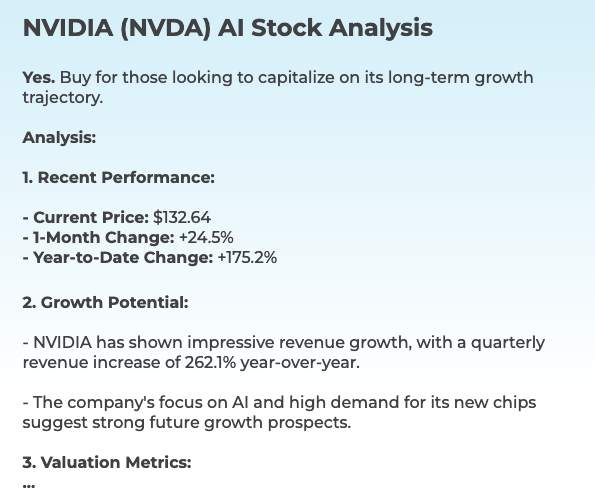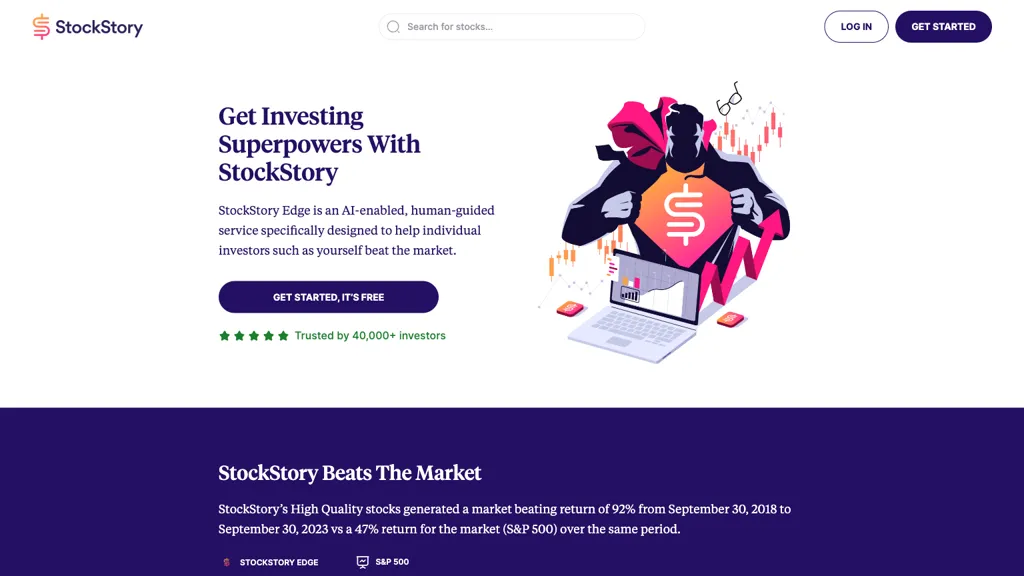To achieve the highest value for your money, you should evaluate and price AI stocks that predict or analyze stock. Pricing can vary greatly and it's crucial to understand the value you get for your money. Here are the top ten tips for evaluating the cost and pricing of these platforms:
1. Learn about the Pricing Model
Subscription-based: Determine whether the platform has a monthly or annual cost and what features are available in each tier.
Pay-per-Use: Find out if the platform charges for usage (e.g. the amount of trades completed or data requests, or even predictions).
Freemium: Check whether a platform offers a limited free tier and adds additional charges to access premium features.
2. Compare Pricing Levels
Compare which features are included with each pricing tier.
Scalability: Ensure that your pricing levels match your needs, regardless of regardless of whether you're a solo trader or professional.
Upgrade flexibility - Look to see if there's any easy ways to upgrade your plan or downgrade it as your needs may be changing.
3. Evaluate Hidden Costs
Data fees: Find out if you are required to pay for accessing premium data.
Brokerage Fees: Determine if your platform charges extra fees for integration or trade execution.
API usage. Determine whether there are additional costs associated with API access and/or high-frequency use.
4. Demos as well as Trials are Available for Free
Trial period. Find platforms that offer the option of a demo or trial so that you can try their features out before committing.
Limitations of the trial Make sure that it is inclusive of all features or if there are limitations in terms of capabilities.
If the program is not right for you, make sure you are able to cancel the trial.
5. Find discounts and special offers
Discounts for annual subscriptions: Check whether the platform offers discounts on annual subscriptions when compared to the monthly plan.
Referral programs: Find out if you can get discounts or credits for referring others to the platform.
Ask about bulk or institutional prices if your business is a large one.
6. Calculate the Return on the investment
Value and cost: Examine the price of a platform with its capabilities. Does it, for example aid you in making a better trade decisions or help you save time.
Examine the platform's performance and user reviews to calculate the potential return on investment.
Alternative costs: Compare the platform's cost with the cost of not using the platform (e.g. missed opportunities, time spent manually analyzing).
Review Refund and Cancellation Policies
Cancellation Terms: You can cancel without hidden charges or penalties.
Refund Policy: Find out whether your subscription allows the amount back if the subscriptions are not being used.
Auto-renewal: Verify that the platform is automatically renewing your account and the best way to opt out.
8. Examine Pricing Transparency
A clear pricing page: Make sure the platform provides a clear and detailed pricing page, with no fees hidden.
Customer Support: Call Customer Service for clarification on any pricing information that is unclear or additional charges.
Contract terms: Ensure you understand the service terms and any fines.
9. Compare to Competitors
Compare features and prices of various platforms to find the most value.
Review of user reviews: Read user feedback and see what other users think about the platform is worthwhile.
Check the market positioning of the platform. Does it meet your expectations?
10. Assess the long-term costs
Price increases: Determine whether there is a consistent pattern of price rises and how frequently they occur.
Additions to features: Check whether new features are included in your current plan, or need an upgrade.
Scalability Costs: Make sure the platform's pricing is fair when your trading activity or demands for data increase.
Bonus Tips
Free trials of different platforms are available to try and evaluate the benefits and performance of different platforms.
Price negotiation: If you own an institution is frequent user, you should consider seeking out discounts or custom pricing.
You should look into educational tools and resources. Many platforms provide free educational tools or materials, which can be an excellent addition to their main features.
Follow these tips to assess the price and cost of AI analysis and stock prediction platforms. Pick one that best meets your needs and falls with your budget. A well-priced trading platform will achieve the ideal balance between features and affordability, allowing you to maximize your success. See the recommended trading ai advice for blog info including stock ai, market ai, using ai to trade stocks, ai investment platform, ai for investment, best ai stock, incite, ai stock trading bot free, using ai to trade stocks, ai for stock trading and more.

Top 10 Tips To Assess The Ability To Scale Ai Stock Predicting/Analyzing Trading Platforms
Scalability is a key factor in determining whether AI-driven platforms that predict stock prices and trading can handle growing demand from users, increasing data volumes and market complexity. Here are top 10 tips on how to evaluate scalability.
1. Evaluate Data Handling Capacity
Check to see if your platform can analyze and process large data sets.
Why? Scalable platforms have to manage increasing volumes of data without performance degradation.
2. Test Real-Time Processing Skills
Find out how the platform handles live streams of data, including stock prices and breaking news.
What is the reason? Trading decisions that are real-time require real-time analysis of data. Delays could lead to lost opportunities.
3. Check Cloud Infrastructure and Elasticity
TIP: Make sure your cloud platform (e.g. AWS, Google Cloud or Azure) and is able to scale resources dynamically.
Cloud-based platforms offer elasticity. They allow the system to be scaled up and down depending on demand.
4. Algorithm Efficiency
Tips: Examine the computational effectiveness and the accuracy of AI models for prediction.
The reason is that complex algorithms consume a lot of energy. So optimizing them will aid in scaling.
5. Examine Parallel and Distributed Computing
Tips: Find out if a platform is able to use distributed computing and parallel processing frameworks.
Why: These technologies accelerate data processing and analysis on multiple nodes.
Review API Integration & Interoperability
Check out the platform's integration capabilities by using APIs from outside.
Why? The platform can adapt to changes in market conditions and data sources because of seamless integration.
7. Analyze User Load Handling
You can simulate the high users and see how the platform reacts.
What's the reason? Performance of a scalable platform is not affected by the rise in users.
8. Assess the model of Retraining and its Adaptability
Tip: Assess how frequently and efficiently AI models are trained with new data.
What's the reason? As markets shift and models are updated, they must be updated frequently to stay accurate.
9. Check Fault Tolerance (Fault Tolerance) and Redundancy
Tip - Make sure that your platform is equipped with failover and redundancy features for dealing with hardware or software failures.
Why: Trading can be expensive, so the ability to handle faults and scale are vital.
10. Monitor Cost Efficiency
Tips: Calculate the cost of the expansion of your platform. Consider cloud resources, storage for data and computational power.
The reason: Scalability should not be at the expense of unsustainable costs. It is thus crucial to strike a fair balance between performance and cost.
Bonus Tip Future-proofing
Check that the platform incorporates new technologies (e.g. quantum computing, advanced NLP), and can adapt to regulatory changes.
You can assess the capacity and effectiveness of AI trading and stock prediction platforms by focusing on this aspect. This will help ensure that they are efficient, robust and capable of growing. Follow the top rated best ai stocks for site recommendations including ai for trading stocks, ai stock price prediction, ai tools for trading, ai stock trader, ai investment tools, stock predictor, ai investment tools, best ai penny stocks, ai stock prediction, best ai penny stocks and more.
